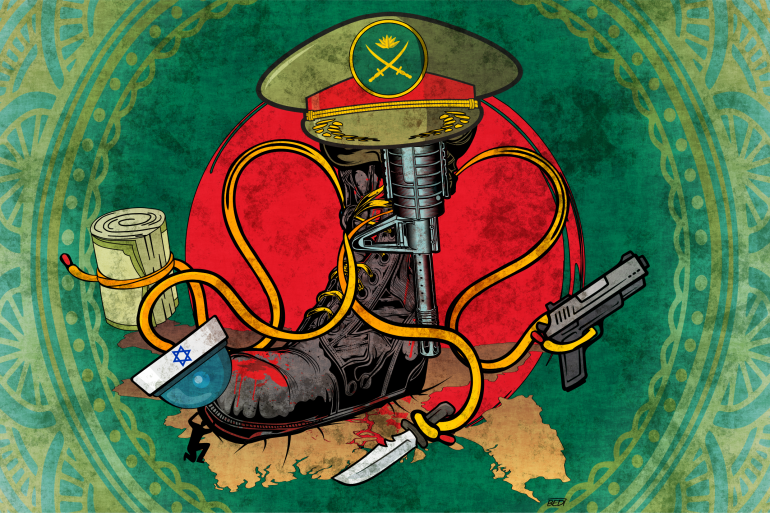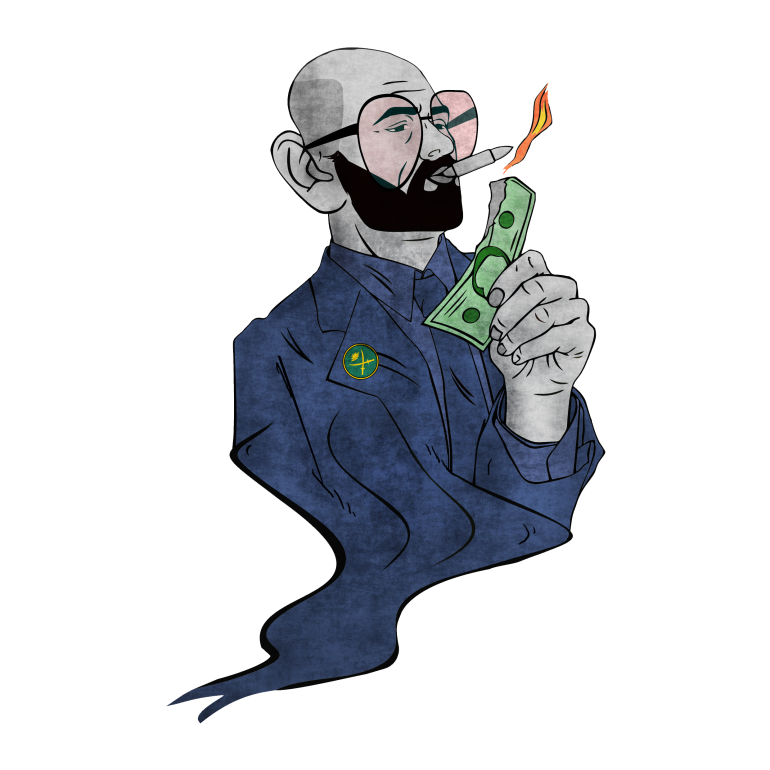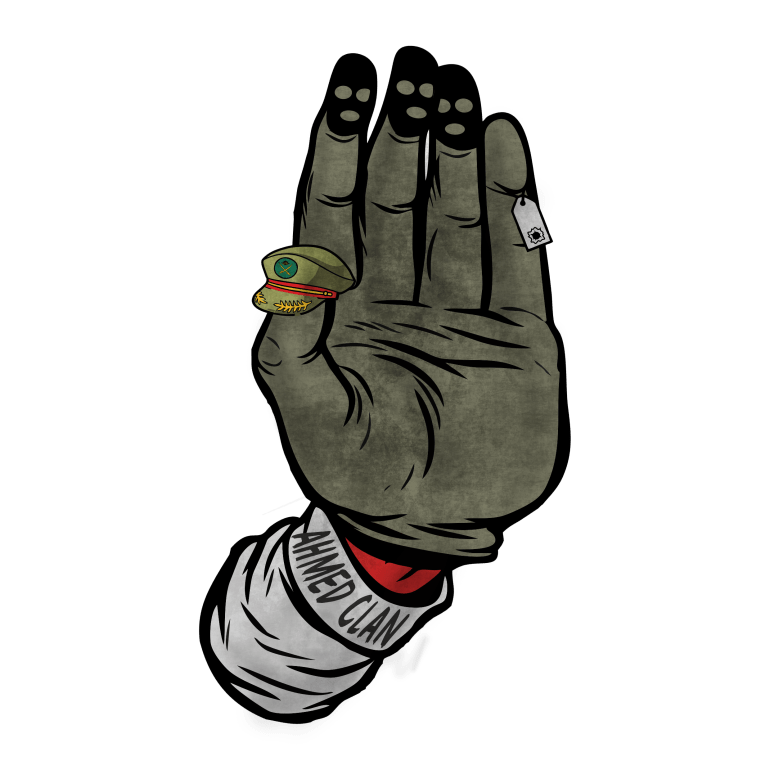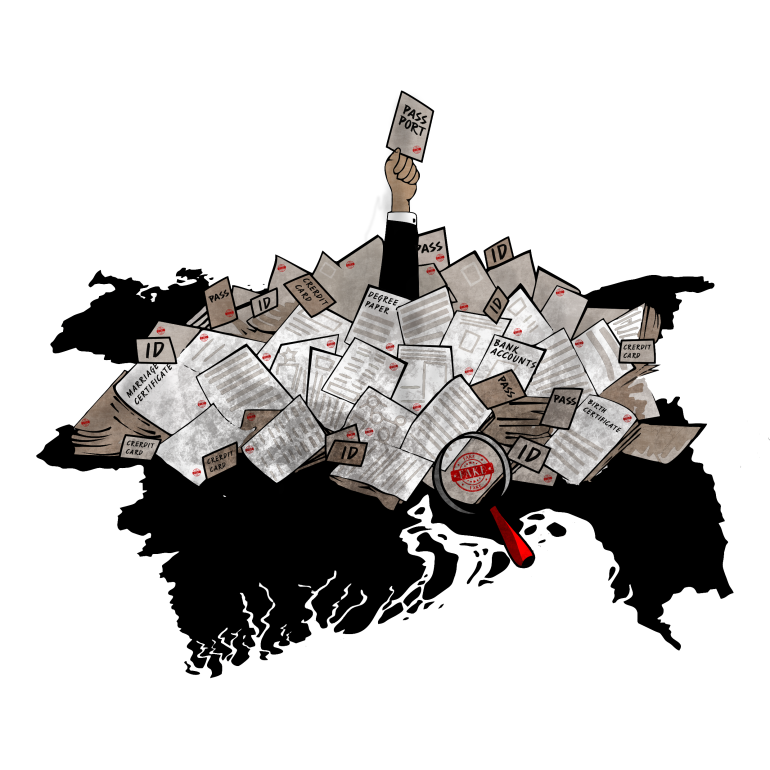The gangster, the general and the prime minister of Bangladesh
The story of how one of Bangladesh’s most notorious gangsters came to have the protection of an army and the loyalty of a leader.

“I can have you killed. But if I kill you, then you won’t feel the pain. I will make you suffer.”
Mohammad Hasan smiled grimly and took a deep drag on his cigarette. His hands, loaded with gold rings and bracelets, clinked as he described how he settled an old score with a rival. A cloud of smoke rose towards the ceiling of the cramped room in a money exchange kiosk on a quiet Budapest backstreet. He expressed little emotion or pity. It appeared to be just business. It was like a scene from a mafia movie.
Keep reading
list of 4 itemsBangladesh bought spyware from Israeli surveillance company
Ten years of Sheikh Hasina: ‘Development minus democracy’
Bangladesh director arrested after film shows police in bad light
He explained how he had enlisted an infamous elite anti-terrorism unit thousands of miles away to track his victim’s mobile phone and arrest him. His remarkable story of revenge and punishment links him to one of the most feared paramilitary groups in the world: the Rapid Action Battalion or RAB, notorious for murders, abductions and torture throughout Bangladesh. It also links him to the very top of that country’s political elite and to one of the most powerful men in the country.
Who is Mohammad Hasan?
Mohammad Hasan is two people, one of whom has a very important family name.
His first identity is that of a small-time businessman from Bangladesh who journeyed thousands of miles to build a new life in Europe. The money exchange, called Bay of Bengal, is one of several ventures Hasan has run in Budapest since arriving in May 2015. The money exchange is illegal with no license to operate, but that does not matter to Hasan.
Next door, tucked away in a narrow street is another of his ventures – a small traditional Hungarian diner trading under the name Gulyas Etterem, Goulash Restaurant. It is in the heart of the old quarter where tourists usually flock, but the restaurant is losing money just like Hasan’s other businesses. He has operated a student hostel, another restaurant in the old quarter and a women’s clothing store. Hasan has money problems, but not the ones you would suspect. There are plenty of funds flowing his way; his problem is working out how to hide this wealth.
But this Mohammad Hasan, slightly built with a taste for expensive clothes, is a work of pure fiction. It is a false identity built on dozens of carefully forged documents that helped Bangladesh’s “most wanted” gangster effectively disappear into thin air. Now Al Jazeera’s Investigative Unit can reveal the real identity of Mohammed Hasan, a man who can boast the loyalty of a world leader and the protection of an army.
His real name is Haris Ahmed and he is the third-oldest son of a large family from the Bangladeshi capital, Dhaka. Born in 1966, he left school early and as a young man quickly found demand for his talent for violence and extortion among the crime gangs of his city. Along with his brothers – Josef, Anis and Tipu – the Ahmed clan built up a fearsome reputation as back-street enforcers for hire; men capable of extreme violence when they deemed it necessary.

The rise of the Ahmed brothers
In the 1980s, the Ahmed clan had established their grip on the sprawling Mohammadpur district of Dhaka, which brought them wealth and prominence. It was a bustling area, full of small businesses and food stalls where the four brothers extorted shop owners to pay for their protection.
Bangladesh in the 1980s was a good place for the Ahmed brothers to ply their trade, a violent and unstable country still raw from civil war and a military coup in which the country’s founding president, Sheikh Mujibur Rahman, and his family were murdered by army officers.
Before 1971, there was no Bangladesh, it was East Pakistan and governed by Islamabad. Known as the father of the nation, Sheikh Mujib had led an uprising against Pakistan. It was a savage war in which the Pakistan army slaughtered at least 300,000 civilians. Pakistan was defeated with decisive military help from neighbouring India, which retains a powerful influence in Bangladesh to this day.
The young nation was seething with political violence and a partnership was soon to emerge between politicians and the street gangs. In return for the patronage of the politicians, gangs provided the muscle that helped them survive.
Do you have information on government corruption or want to share another tip? Contact Al Jazeera’s Investigative Unit on +974 5080 0207 (WhatsApp/Signal), or find other ways to reach out on our Tips page.
The Ahmed clan’s networks in the Dhaka underworld proved critical to the survival of the leaders of the Awami League, the political party previously led by the murdered Sheikh Mujib. By now it was led by his daughter Sheikh Hasina, who had returned to Bangladesh from exile in India in 1981.
It was a particularly challenging time for the young politician, the oldest of Sheikh Mujib’s children. She and her sister, Sheikh Rehana, only escaped the violent fate of their family as they were out of the country at the time. In 1982, following yet another coup, the military-backed government of General Hussain Muhammad Ershad seized power. Sheikh Hasina faced the constant threat of house arrest, detention and physical attack.
Amidst the violence and uncertainty, the Ahmed brothers became the unofficial security cordon that shielded Sheikh Hasina. They guarded her at rallies and provided safe houses where Awami League politicians could meet without fear of arrest or attack.
The brothers were feared. But they were also to face vengeance. Tipu was the youngest and, according to a friend, the most intelligent of the brothers. After establishing himself as the don who ran Mohammadpur, he was murdered in 1999 in a gangland killing.
Two decades earlier, while four of the Ahmed brothers worked their way up the ranks of Dhaka’s criminal underworld, a fifth, Aziz Ahmed, chose a different path when he enlisted in the Bangladesh army. His colleagues at the Bangladesh Military Academy rated him as an unremarkable officer, but Aziz rose quickly through the ranks, his promotions in lockstep with the growing political power of Sheikh Hasina.

In the cycle of shootings, beatings and murders in Dhaka, one gruesome killing changed the destiny of the Ahmed clan forever. In 1996, Mustafizur Rahman Mustafa was gunned down in a dusty back street by three Ahmed brothers; Anis, Haris and Josef. Despite being riddled with bullets Rahman survived long enough to be the star witness at his own murder trial. His testimony, delivered from his deathbed in hospital, sealed the fate of the Ahmed gang at a trial in 2004.
There are conflicting reports about who Rahman was; one version is that he was a member of the Freedom Party, founded by the officers who assassinated Sheikh Hasina’s father, and that he was part of a mob that attacked her house with grenades in 1989. In a bizarre twist, nearly a year after Rahman’s murder he was charged posthumously with the assault on her home, the same place where her father was slain and that is now a national memorial. Others, including his wife, claim his murder was a part of a gang feud. The shooting took place in broad daylight as a crowd looked on. There were many witnesses, and while doubt lingers over the motive, there is none about the culprits.
In 2004, Josef Ahmed was sentenced to death for the murder. His brothers, Anis and Haris, were given life in prison but managed to flee the country. It is thought that Anis Ahmed went to Malaysia and Haris went into hiding in India, possibly with the protection of Indian military intelligence.
An important bond
To escape justice in Bangladesh is one thing, but to stay beyond the reach of the law requires money, contacts and a powerful network. Here the Ahmed gang had a highly placed asset – thanks to the meteoric rise of their brother, Aziz Ahmed, who by 2012 had been promoted to head the Border Guards Bangladesh (BGB), the country’s oldest uniformed force. Under his command, the BGB launched a crackdown on opposition parties. Aziz played an important role in securing an election victory for Sheikh Hasina during the street violence of the 2014 general election.
Where were you all when grenades were thrown in my house?
By June 2018, Aziz was promoted to chief of army staff, with Prime Minister Sheikh Hasina personally presiding over the ceremony as the minister of defence. That the prime minister is also the head of the armed forces is a mark of the central role played by the military in Bangladeshi politics. The Ahmed clan had proved themselves loyal to Sheikh Hasina and she, in turn, appointed their brother to command her army.
Later that year, General Aziz’s soldiers guarded the country’s polling stations as the Awami League won another landslide victory. That same year, Aziz’s brother Josef, who had earlier had his death sentence commuted to life imprisonment, was released from prison by a highly unusual presidential pardon.
The bond of security and service between the Ahmed clan and the politically ruthless Sheikh Hasina appeared to have come full circle.
The making of Mohammad Hasan
Al Jazeera’s Investigative Unit has obtained secret audio recordings of phone calls made by General Aziz that reveal the strength of that bond. In one call he recounts how Prime Minister Sheikh Hasina praised his brothers to senior party members: “Look, you don’t know better than me who his brothers are. Where were you all when grenades were thrown in my house? These things were happening to my house. Where were you? This chief’s brothers were all around me.”
According to Aziz, Sheikh Hasina also described his brothers as her “mainstay”.
In another covert recording to a former military colleague, General Aziz underlined the Ahmed clan’s loyalty to the Prime Minister. “Listen, my friend, even after all these things, these brothers have not changed sides. We just don’t have that sort of blood. We just aren’t built to betray.”
Aziz rose quickly through the ranks, his promotions in lockstep with the growing political power of Sheikh Hasina.
On December 9, 2014, General Aziz strode into the swish marble lobby of the Kempinski Hotel in Budapest. The general was an official delegate at the World Borderpol Congress, where border police chiefs gather to discuss security and immigration. No better place to hatch a plan to smuggle a fugitive across an international frontier using a false passport. It would have made a good case study for his fellow delegates.
Bangladesh embassy officials had asked a young Bangladeshi to help General Aziz during his stay in Hungary. Sami, whose name we have changed for his safety, was a 30-year-old entrepreneur making his way in Hungary. He felt honoured to help a visiting VIP from his homeland.
As the pair enjoyed a river cruise on the icy waters of the Danube, the historic city of Budapest gliding past their dinner table, General Aziz asked Sami a question: would he help the general’s brother, a man named Mohammad Hasan, set up a business in Budapest and acquire residency? It seemed a simple enough request.
![Haris and Aziz in Budapest, Hungary [Al Jazeera]](/wp-content/uploads/2021/02/IMG_0273-copy.jpg?w=770&resize=770%2C578)
But that request for help on a cold December night would eventually unravel a criminal conspiracy that reaches the highest political office in Bangladesh and led a young man to take a risk that has left him fearing for his life. Sami agreed to help, but it was only a matter of time before he would discover the dangerous secret that Mohammad Hasan was really Haris Ahmed, a gangster on the run with more power and money than Sami could imagine.
In the months that followed, Sami was sent legal documents and papers from officers under Aziz Ahmed’s command in the BGB. They were stamped, signed and witnessed by officials from the Ministry of Foreign Affairs, bank managers, lawyers and consulate staff in Bangladesh and India. It was an elaborate paper chain of fraudulent documents that transformed Haris Ahmed into Mohammad Hasan.
If my brother has to return, people responsible will repent.
The subterfuge was on an impressive scale. How far back do you need to go to create a false identity for a notorious criminal? The man charged with guarding a nation’s borders, General Aziz, knew the answer; you have to go back to the beginning and you need to know the right people to get you there.
In the course of investigating this story, Al Jazeera’s Investigative Unit obtained more than 50 documents that became the building blocks of Haris’s new identity: fake birth certificates, fake marriage certificates, fake degree papers, fake bank accounts, fake police reports, fake signatures attested by lawyers and, of course, the most important fake document of all, a passport.
![Haris Ahmed's fake passport, which uses the name Mohammad Hasan. [Al Jazeera]](/wp-content/uploads/2021/02/hassan_passport.jpg?w=770&resize=770%2C947)
Armed with a raft of forged paperwork, the newly created Mohammad Hasan, with close support from his brother, the general, moved swiftly to create or buy stakes in companies in Hungary – Bay of Bengal Kft, Taylorville Kft and briefly Consultech Europe Kft – which could own property, run restaurants, import and export goods and even set up a money exchange kiosk for tourists.
Now Haris had to handle large sums of money being channelled into Europe from Bangladesh. He had to keep moving, keep buying property and businesses and keep creating ways to hide hundreds of thousands of dollars. France was his next target where, using his fake identity, he bought a stake in five companies and purchased a house in Paris. The choice of company names had a familiar ring; Bay of Bengal, Info Bay of Bengal as well as Snigdha. For a short while, he also owned TPTY and MHPB Holdings. At the registered address of one of his companies is a store offering international money transfers.

An undercover source
Sami had helped “Mohammad Hasan” in Hungary but there was growing pressure from an increasingly frustrated General Aziz who started sending a stream of emails and texts to Budapest. He was worried that “Hasan” was not making his new life and would eventually have to return to Bangladesh. The tone became threatening and dark. By the summer of 2016 Sami sensed danger. “If my brother has to return, people responsible will repent. They will curse their life, I promise,” the general wrote.
Sami wanted to find out more about “Mohammad Hasan” and decided to use his contacts in the Bangladesh army who told him to look no further than Interpol’s Red Notice list, an electronic bulletin board for the world’s most dangerous criminals. Type in nationality – Bangladesh, name, Haris Ahmed and hit return.
Staring back at him was a faded black and white photo of “Mohammad Hasan” – younger, heavier and rougher-looking but unmistakably the same man. It was the convicted killer, Haris Ahmed.
Sami was in too deep and decided the only way to break free from the powerful Ahmed clan was to go deeper still and expose their criminal network. He had seen enough to know that Haris had powerful links in Hungary. It was then that Al Jazeera’s Investigative Unit gained a new asset, an undercover source who would help reveal the full scale of the Ahmed clan’s dealings.
Sami arranged a business meeting for Mohammad Hasan at a hotel along the river Danube. The hotel staff laid out the executive breakfast of fresh fruit, coffee, pastries and orange juice in the business suite. Three men in smart suites came to attention as a laptop sprang into life – a Skype call was incoming from London and with it came the possibility of huge profits from a land deal in Bangladesh.
My gangsters are RAB. I don’t need thugs, these are my thugs
It was a sting. Sami had introduced Haris Ahmed and his business associate, Mohammed Rahman, to a fictional investor who said he wanted to build a multimillion-dollar hotel in Bangladesh. The Investigative Unit had set the entire meeting up to find out how Haris was making money.
Haris fiercely scribbled numbers on a note pad while Rahman, who brokers citizenship-by-investment passports to Canada and elsewhere for wealthy Bangladeshis, got down to business. There was good money to be made and no time to waste.
“To do something in Bangladesh is a really great idea, but there’s some problems because still there’s political issues and a little bit of corruption,” he told the fake investor. “But a good thing for Mr Hasan, because he is very well connected with high officials, very connected with the government, especially the prime minister herself likes him very much.”
Hidden cameras recorded the scene as Haris Ahmed became more animated. As millions of dollars were discussed he reached for his gold-coloured mobile phone and thrust it at the laptop camera. On the phone was a photo of himself with General Aziz in full military uniform greeting foreign dignitaries. Rahman explained Haris’s spontaneous act, gesturing at the picture. “Basically at this moment, his elder brother is running the country in fact, because our prime minister leaves everything to (the) army chief to run the country for the big developments.”

Rahman and Haris went on to promise access to the highest officials in Bangladesh, from the banks to the ministries and from the military chiefs to the prime minister herself.
Over the following weeks, Sami continued to operate as our undercover investigator, probing Haris for more information about the source of his wealth. In our secret recordings, Haris claimed that he had been given the full support of Sheikh Hasina to profit from any Bangladesh government contracts in Europe, be they for military bunk beds, bullets or surgical masks. He relayed to our hidden microphones how he could make money from military postings, from fixing court proceedings or from using the infamous RAB to extort money from businessmen.
Haris said he pays bribes to both the head of the RAB and the country’s most powerful policemen. “My gangsters are RAB,” he told Sami. “I don’t need thugs, these are my thugs. They pick someone up and detain them. They make money. I make money. It’s a straightforward deal.”
![Haris Ahmed, Aziz Ahmed and several foreign dignitaries [Al Jazeera]](/wp-content/uploads/2021/02/dignitaries.jpg?w=770&resize=770%2C578)
Displays of power and acts of defiance
But what of the wider Ahmed clan? After months of tracking Haris Ahmed, we were tipped off that General Aziz could be meeting the other brothers for a get-together in the Malaysian capital, Kuala Lumpur.
The tannoy system at Kuala Lumpur International airport echoed around the arrivals hall as passengers peered anxiously, looking for friends or relatives. Among the jostling crowds stood two men, mobile phones clutched to their ears, waiting and watching for someone to come through customs. Haris and Joseph Ahmed were to be the reception party for their brother, General Aziz.
A data search had also revealed an address. A land registry shows that a large gated house had been purchased by Mohammad Hasan and Anis Ahmed, the remaining brother who absconded in 2007 and has not been seen publicly since.
![Land deed showing Anis and Haris bought a plot in Malaysia [Al Jazeera]](/wp-content/uploads/2021/02/Screenshot-2021-02-01-at-17.31.50.png?w=695&resize=695%2C841)
As the light began to fail a small convoy of cars, two bearing diplomatic plates, swept up to the entrance of a large gated house in central Kuala Lumpur. General Aziz, with Josef alongside, stepped briskly into the wet. From behind the gates, Anis Ahmed emerged from the shadows. The Investigative Unit had tracked down the final missing brother.
The following day, under the cover of a stormy night, we watched as the Ahmed clan, escorted by a diplomatic convoy, were ushered through the security gates of the nearby High Commission of Bangladesh for the evening.
A week earlier, in March 2019, a society wedding had taken place in Dhaka for the oldest son of General Aziz. It was a lavish event held over several days, with thousands of guests entertained by military bands at an exclusive army club. The Investigative Unit was able to obtain several photos secretly taken during the celebrations.
![Haris Ahmed, Aziz Ahmed and President Abdul Hamid [Al jazeera]](/wp-content/uploads/2021/02/1.jpg?w=745&resize=745%2C712)
It was an extraordinary display of wealth and power. It was an even bolder act of public defiance. The four Ahmed brothers, two of whom were criminals on the run, were paraded before the political and military elite of Bangladesh. The guest of honour was the president of Bangladesh, Mohammed Abdul Hameed.
It has been a long journey for the Ahmed family but they have finally arrived. From being a small-time mafia on the dangerous streets of Mohammadpur, the clan now has a firm grip on the institutions of the state in Bangladesh.
The Investigative Unit contacted all those involved – including Bangladesh’s prime minister, president, the then-head of the RAB, Mohammed Rahman, and all four Ahmed brothers – inviting them to respond to its findings. None provided a response before the release of the investigation.
After the release of the investigation, Bangladesh’s Ministry of Foreign Affairs issued a statement describing the Investigative Unit’s findings as a “smear campaign” orchestrated by opponents of the regime based abroad.
It dismissed statements made by Haris, the brother of Bangladesh’s chief of army staff, as baseless and said Haris Ahmed had no links to Prime Minister Sheikh Hasina or any other state institution.